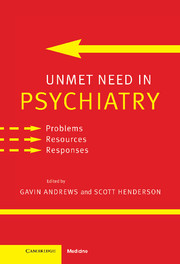Book contents
- Frontmatter
- Contents
- List of Contributors
- Preface
- Part I Unmet need: defining the problem
- 1 Assessing needs for psychiatric services
- 2 Unmet need: a challenge for governments
- 3 Meeting the unmet need with disease management
- Part II Unmet need: general problems and solutions
- Part III Unmet need: people with specific disorders
- Part IV Unmet need: specific issues
- Part V Unmet need: conclusion
- Index
2 - Unmet need: a challenge for governments
from Part I - Unmet need: defining the problem
Published online by Cambridge University Press: 21 August 2009
- Frontmatter
- Contents
- List of Contributors
- Preface
- Part I Unmet need: defining the problem
- 1 Assessing needs for psychiatric services
- 2 Unmet need: a challenge for governments
- 3 Meeting the unmet need with disease management
- Part II Unmet need: general problems and solutions
- Part III Unmet need: people with specific disorders
- Part IV Unmet need: specific issues
- Part V Unmet need: conclusion
- Index
Summary
Governments around the world are struggling to find ways to improve the health status of their populations. Priorities change within and between countries; however, modern public health programs and clinical medicine now offer more than can be bought by historically set health budgets. When this is combined with the considerable unmet need for health services, including mental health and substance-abuse services, the politicians and the government departments responsible for health have an unenviable challenge.
The general population, health professionals and consumer groups all routinely demand new or better health services. In my experience, politicians generally try to do what they believe the electorate wants and respond to these demands. At the same time, they are wary of the disproportionate influence of vested interests, but do acknowledge that these groups are often well organized and skillfully use the media to apply pressure to governments. So usually there are demands for more money, and for a greater slice of the available public or private payers' budget for health care. There has been little public debate on how much a country should spend on health versus, for example, education, law and order or defence. How do we know if the Organization for Economic Co-operation and Development (OECD) average of around eight percent of gross domestic product (GDP) is right? The most successful national example of expanding health expenditure is the USA. This experience clearly shows that doubling the proportion of the GDP a country spends on health services does not, by itself, fix that many problems. It shifts the cut-off point where funding is stopped, but does not change the fundamental problem of how governments allocate scarce resources and respond to unmet need.
Keywords
Information
- Type
- Chapter
- Information
- Unmet Need in PsychiatryProblems, Resources, Responses, pp. 8 - 10Publisher: Cambridge University PressPrint publication year: 2000
Accessibility standard: Unknown
Why this information is here
This section outlines the accessibility features of this content - including support for screen readers, full keyboard navigation and high-contrast display options. This may not be relevant for you.Accessibility Information
- 6
- Cited by
